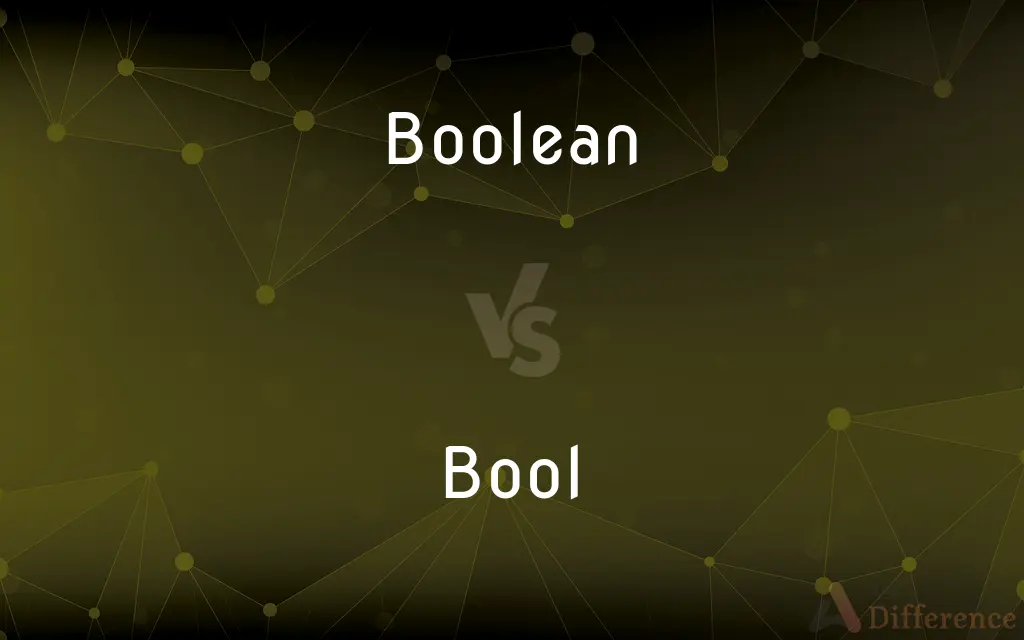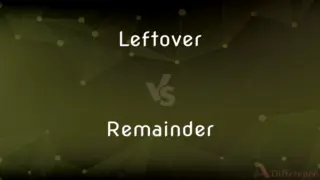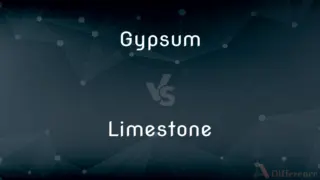Boolean vs. Bool — What's the Difference?
By Fiza Rafique & Urooj Arif — Updated on March 28, 2024
Boolean refers to a data type representing two values (true or false), while bool is a specific implementation of the Boolean type in certain programming languages like C++ and Python.

Difference Between Boolean and Bool
Table of Contents
ADVERTISEMENT
Key Differences
Boolean is a fundamental concept in computer science and logic, named after George Boole, an English mathematician. It's used to represent binary values: true or false, often in the context of logical operations and decision-making in programming. The term "Boolean" encompasses the theoretical basis as well as its practical applications across various programming languages and systems. On the other hand, "bool" is a keyword in some programming languages, such as C++ and Python, that defines a variable or data type specifically designed to hold a Boolean value (true or false). The bool data type is a practical implementation of the Boolean concept, tailored to the syntax and functionalities of a particular programming language.
While Boolean represents the abstract concept and can be implemented in various ways depending on the programming language or system, bool is more concrete, referring directly to the data type used within code. For example, in C++, declaring a bool variable involves using the keyword "bool," which allocates memory for a true or false value, directly applying the Boolean concept in a practical programming scenario.
The difference between Boolean and bool can also reflect the distinction between theoretical computer science and practical programming. Boolean logic is a branch of algebra that deals with true and false values, widely applicable in fields such as mathematics, computer science, and electrical engineering. Meanwhile, bool is a tool that programmers use to apply Boolean logic within specific coding environments, enabling the creation of conditional statements, control flow, and logical expressions.
Understanding the relationship between Boolean and bool is crucial for programmers, as it bridges the gap between theoretical concepts and practical application in software development. Whether using Boolean algebra to design a digital circuit or employing bool variables in a software program, the underlying principle of representing binary states remains consistent, showcasing the versatility and importance of Boole's legacy in modern technology.
Comparison Chart
Definition
A data type representing two values: true or false.
A specific implementation of the Boolean type in programming languages.
ADVERTISEMENT
Origin
Named after George Boole, representing a concept in logic.
Derived from Boolean, used as a keyword in certain programming languages.
Scope
Theoretical and applicable across various fields.
Specific to programming, depending on the language syntax.
Usage
Foundational in computer science, mathematics, and logic.
Used in coding to define variables or data types for logical operations.
Practical Example
Boolean algebra in digital circuit design.
Declaring a variable in C++: bool isFinished = true;
Compare with Definitions
Boolean
Fundamental in conditional statements and algorithms.
Boolean logic determines the outcome of logical operations.
Bool
Essential for control structures and logical expressions.
If (bool condition) {...} controls program flow based on a condition.
Boolean
Can be implemented in multiple programming languages.
Many languages support Boolean types for logical decisions.
Bool
Reflects the practical application of Boolean logic.
Using bool to manage game states in video game programming.
Boolean
Used in various fields, including mathematics and engineering.
Boolean algebra simplifies the design of digital circuits.
Bool
A data type in languages like C++ and Python for true or false values.
Bool isActive = false; sets an active state.
Boolean
Represents binary values (true or false) in logic and computing.
A Boolean expression can control the flow of a program.
Bool
Allocates memory for storing Boolean values in code.
Declaring a bool variable reserves space for a true or false value.
Boolean
Influences decision-making processes in software development.
Boolean variables are crucial for if-else statements.
Bool
Directly implements the Boolean concept in programming.
The bool type is used to evaluate conditions in a program.
Boolean
Any kind of logic, function, expression, or theory based on the work of George Boole is considered Boolean. Related to this, "Boolean" may refer to: Boolean data type, a form of data with only two possible values (usually "true" and "false") Boolean algebra, a logical calculus of truth values or set membership Boolean algebra (structure), a set with operations resembling logical ones Boolean domain, a set consisting of exactly two elements whose interpretations include false and true Boolean circuit, a mathematical model for digital logical circuits.
Bool
(programming) A Boolean variable (one whose value is either true or false).
Boolean
Of or relating to a logical combinatorial system treating variables, such as propositions and computer logic elements, through the operators AND, OR, NOT, and XOR
A browser that supports Boolean searches.
Bool
2008|passage=Listing 7-11 shows an example where the initial data type is string, but I will obtain its value as a bool.}}
Boolean
Of or relating to a data type or variable in a programming language that can have one of two values, true or false.
Bool
(slang) To relax or hang out (especially with someone).
I'm going to go bool with the boys.
Boolean
Alternative case form of Boolean
Boolean
Alternative case form of Boolean
Boolean
Of or relating to a combinatorial system devised by George Boole that combines propositions with the logical operators AND and OR and IF THEN and EXCEPT and NOT
Common Curiosities
What does the term "bool" refer to?
The term "bool" refers to a specific implementation of the Boolean data type in programming languages, used to store true or false values.
Why is Boolean logic important in programming?
Boolean logic is essential for creating conditional statements, controlling program flow, and executing logical operations, forming the foundation of decision-making in programming.
Is there a difference between Boolean variables and boolean expressions?
Boolean variables store true or false values, while boolean expressions evaluate to a Boolean value based on logical conditions.
How is Boolean used in computer science?
In computer science, Boolean is used in logical operations, algorithms, and decision-making processes within software and hardware design.
How are Boolean values represented in digital electronics?
In digital electronics, Boolean values are represented by binary states, such as voltage levels, where 0 can represent false, and 1 represents true, applying Boolean algebra to circuit design.
What is a Boolean?
A Boolean is a data type that represents two possible values: true or false, used in logic and computing.
What is the difference between Boolean and bool in programming?
The main difference is that Boolean is the conceptual data type, while bool is a specific keyword or implementation of Boolean in programming languages.
Can all programming languages use bool?
Not all programming languages use the keyword "bool" specifically; the implementation and naming can vary, though the concept of Boolean values is universal.
How do you declare a Boolean variable in C++?
In C++, a Boolean variable is declared using the "bool" keyword, followed by the variable name and value, e.g., bool isOnline = true;.
What roles do Boolean and bool play in software development?
Both play crucial roles: Boolean principles guide logical structure and decision-making, while bool variables implement these principles in software code.
Share Your Discovery

Previous Comparison
Leftover vs. Remainder
Next Comparison
Gypsum vs. LimestoneAuthor Spotlight
Written by
Fiza RafiqueFiza Rafique is a skilled content writer at AskDifference.com, where she meticulously refines and enhances written pieces. Drawing from her vast editorial expertise, Fiza ensures clarity, accuracy, and precision in every article. Passionate about language, she continually seeks to elevate the quality of content for readers worldwide.
Co-written by
Urooj ArifUrooj is a skilled content writer at Ask Difference, known for her exceptional ability to simplify complex topics into engaging and informative content. With a passion for research and a flair for clear, concise writing, she consistently delivers articles that resonate with our diverse audience.
















































